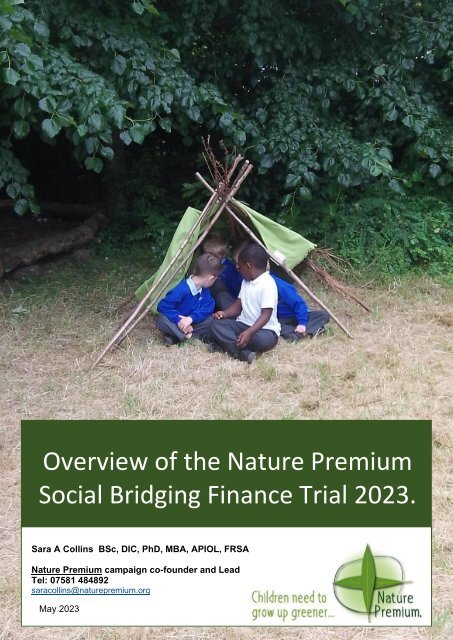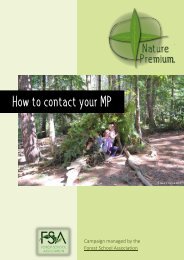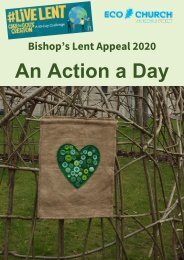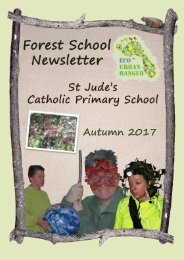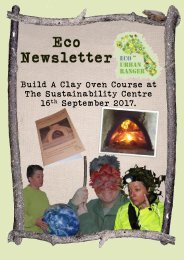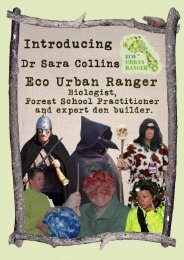Overview of the Nature Premium SBF Trial May 2023
The Nature Premium campaign is calling for the UK government to guarantee regular and ongoing nature experiences for all children and young people with additional funding for those that need it most.
The Nature Premium campaign is calling for the UK government to guarantee regular and ongoing nature experiences for all children and young people with additional funding for those that need it most.
Create successful ePaper yourself
Turn your PDF publications into a flip-book with our unique Google optimized e-Paper software.
<strong>Overview</strong> <strong>of</strong> <strong>the</strong> <strong>Nature</strong> <strong>Premium</strong><br />
Social Bridging Finance <strong>Trial</strong> <strong>2023</strong>.<br />
Sara A Collins BSc, DIC, PhD, MBA, APIOL, FRSA<br />
<strong>Nature</strong> <strong>Premium</strong> campaign co-founder and Lead<br />
Tel: 07581 484892<br />
saracollins@naturepremium.org<br />
<strong>May</strong> <strong>2023</strong><br />
1
1 in 8 young people<br />
have never seen a cow<br />
in real life!<br />
The <strong>Nature</strong> <strong>Premium</strong> campaign is<br />
calling for <strong>the</strong> government to<br />
guarantee regular and ongoing time in<br />
nature for ALL children and young<br />
people with additional funding for<br />
2<br />
those that need it most.
The <strong>Nature</strong> <strong>Premium</strong> is a proposal to<br />
guarantee regular and ongoing time in<br />
nature for ALL children and young people<br />
with additional funding for those that need<br />
it most.<br />
Why is it important for children and young<br />
people to connect with nature?<br />
● Government research shows that 87% <strong>of</strong><br />
children have stated that being in nature<br />
makes <strong>the</strong>m ‘very happy’.<br />
● Connecting with nature improves mental<br />
and physical health and educational,<br />
emotional and personal development. For<br />
example, a close relationship with nature<br />
is 4 times more important than purchasing<br />
power for feeling your life is worthwhile.<br />
● There are fur<strong>the</strong>r benefits to local<br />
communities, <strong>the</strong> UK economy, and <strong>the</strong><br />
environment. A recent Natural England<br />
report, forecast shows Social Return on<br />
Investment (SROI) for schools that have<br />
embedded learning outside <strong>the</strong> classroom<br />
in natural environments as a whole school<br />
approach is £4.32 for every £1 invested.<br />
Why do early years & schools need funding<br />
to guarantee regular time in nature for all?<br />
● All children need to consciously ‘grow up<br />
greener’. It is good for children and our<br />
communities. Their engagement and<br />
understanding <strong>of</strong> <strong>the</strong> natural world will<br />
inspire <strong>the</strong>m to respect and protect <strong>the</strong>ir<br />
school, local community, and planet earth.<br />
● Unless personally motivated, many<br />
teachers, just like <strong>the</strong> general public, have<br />
little knowledge or experience <strong>of</strong> <strong>the</strong><br />
benefits <strong>of</strong> nature connection. Unlike<br />
teaching PE, teachers are less likely to<br />
have personal reference points or<br />
experiences to prime <strong>the</strong>ir teaching about<br />
or in nature.<br />
● Provision <strong>of</strong> funding amplifies <strong>the</strong><br />
message that teaching about, in, with, as,<br />
for and from nature is a priority.<br />
● Financial capacity would enable schools<br />
to provide CPD during <strong>the</strong> working day<br />
ra<strong>the</strong>r than expecting staff to volunteer to<br />
work more evenings or weekends.<br />
● The <strong>Nature</strong> <strong>Premium</strong> would provide<br />
financial capacity to deliver regular and<br />
ongoing nature experiences when school<br />
finances are already over-stretched.<br />
● A <strong>Nature</strong> <strong>Premium</strong> would ensure that All<br />
children benefit from regular nature<br />
experiences, not just <strong>the</strong> lucky ones.<br />
How will you persuade <strong>the</strong> Government to<br />
fund <strong>the</strong> <strong>Nature</strong> <strong>Premium</strong>?<br />
We know that <strong>the</strong> DfE accepts that children’s<br />
mental wellbeing is supported by improved<br />
nature-connection. The <strong>Nature</strong> <strong>Premium</strong><br />
would be regarded as innovative so, at a time<br />
<strong>of</strong> economic crisis, it’s important that we help<br />
support <strong>the</strong> DfE introduce this evidence<br />
informed education policy that is likely to cost<br />
£1 billion annually.<br />
We propose running a Social Bridging<br />
Finance <strong>Trial</strong> (<strong>SBF</strong>) <strong>of</strong> <strong>the</strong> <strong>Nature</strong> <strong>Premium</strong>.<br />
<strong>SBF</strong> is a model designed to change policy at<br />
scale. In this instance <strong>the</strong> DfE, funders and<br />
<strong>Nature</strong> <strong>Premium</strong> campaign would work<br />
toge<strong>the</strong>r to agree Key Outcomes for <strong>the</strong> trial.<br />
The funders would fund <strong>the</strong> trial, <strong>the</strong> <strong>Nature</strong><br />
<strong>Premium</strong> would implement <strong>the</strong> work, and <strong>the</strong><br />
DfE would agree to sustainably fund a <strong>Nature</strong><br />
<strong>Premium</strong>, using a coalition <strong>of</strong> blended funding,<br />
but only when <strong>the</strong> Key Outcomes are<br />
achieved. This provides a risk-free<br />
mechanism for <strong>the</strong> DfE to explore a concept<br />
that <strong>the</strong>y already accept benefits children’s<br />
mental wellbeing.<br />
Assumptions<br />
● <strong>Nature</strong> <strong>Premium</strong> funding goes directly<br />
from <strong>the</strong> funder to <strong>the</strong> education settings.<br />
● Each early years provider or school<br />
agrees to Key Indicators & Key Outcomes.<br />
● Each early years provider or school<br />
interprets nature according to its location,<br />
<strong>the</strong> experiences <strong>of</strong> its children, <strong>the</strong><br />
interests <strong>of</strong> <strong>the</strong> staff and <strong>the</strong>ir connection<br />
with <strong>the</strong> community.<br />
● Funding will be used following 5 Key<br />
Indicators (training staff, using external<br />
expertise, modifying grounds, buying kit,<br />
work in <strong>the</strong> community).<br />
● Staff will be supported by a <strong>Nature</strong><br />
<strong>Premium</strong> facilitator who will coordinate<br />
with local conservation/farming/gardening<br />
NGO’s and local government.<br />
● Key Outcomes will be determined with<br />
input from Natural England, The Royal<br />
College <strong>of</strong> Psychiatry, funders, and <strong>the</strong><br />
Department for Education (DfE).<br />
1
How much funding would each school<br />
receive as <strong>the</strong> <strong>Nature</strong> <strong>Premium</strong>?<br />
We propose that each Key Stage should<br />
receive £5000 plus £100 for each child or<br />
young person known to be eligible for free<br />
school meals (FSM) and £25 for each child or<br />
young person not eligible for free school meals<br />
(non-FSM). This means that each school<br />
would receive annual funding, dependent on<br />
<strong>the</strong>ir size and cohort.<br />
What would this funding buy?<br />
Early year providers and schools are<br />
autonomous, meaning that each education<br />
setting will make unique decisions as to how<br />
<strong>the</strong> <strong>Nature</strong> <strong>Premium</strong> should be used<br />
considering <strong>the</strong>:<br />
● Location - urban, rural, coastal, moorland,<br />
wooded, farmland and more.<br />
● The age <strong>of</strong> <strong>the</strong> children & young people.<br />
● The life experiences <strong>of</strong> <strong>the</strong> children and<br />
young people.<br />
● The interest & experience <strong>of</strong> staff.<br />
● Broad definition <strong>of</strong> nature as farming,<br />
conservation work, gardening, urban<br />
farms, Forest School, fishing,<br />
permaculture, adventurous activities,<br />
improving local biodiversity, beekeeping<br />
and more. Schools/EY settings could<br />
work with NGOs that supported <strong>the</strong>ir<br />
interest in nature.<br />
Ultimately <strong>the</strong> <strong>Nature</strong> <strong>Premium</strong> would change<br />
<strong>the</strong> education culture by:<br />
• Demonstrating that nature is a priority,<br />
engage <strong>the</strong> wider education community to<br />
include ALL C&YP developing and<br />
embedding a growing Sustainable<br />
Education culture. This will streng<strong>the</strong>n<br />
communities to benefit <strong>the</strong> local education,<br />
health, and economy.<br />
• Acting as a catalyst between <strong>the</strong><br />
aspirations <strong>of</strong> a future Net Zero society<br />
and <strong>the</strong> practicalities <strong>of</strong> creating a<br />
knowledgeable and resilient future<br />
workforce.<br />
• Providing financial capacity to enable<br />
schools to support staff and C&YP nature<br />
connection.<br />
How could <strong>the</strong> early year providers and<br />
schools use <strong>the</strong> funding?<br />
As with <strong>the</strong> Sports <strong>Premium</strong>, <strong>the</strong> <strong>Nature</strong><br />
<strong>Premium</strong> could be used for five Key<br />
Indicators which should demonstrate<br />
improvement in:<br />
1. The engagement <strong>of</strong> all C&YP with regular<br />
nature connection activities. The pr<strong>of</strong>ile <strong>of</strong><br />
nature and sustainable living would be<br />
raised across <strong>the</strong> school as a tool for<br />
whole-school improvement.<br />
2. Increased confidence, knowledge and<br />
skills <strong>of</strong> all staff teaching about nature and<br />
sustainable living.<br />
3. Broader experience <strong>of</strong> nature <strong>of</strong>fered to all<br />
C&YP.<br />
4. Increased participation in communitybased<br />
nature activities.<br />
These Key Indicators could be achieved by:<br />
● Training all staff.<br />
● Working with external experts and NGOs.<br />
● Buying essential kit e.g. wet wea<strong>the</strong>r gear.<br />
● Assessing and improving biodiversity in<br />
<strong>the</strong> school grounds.<br />
● Enabling <strong>the</strong> school estate to function<br />
sustainably.<br />
● Working in <strong>the</strong> community on Climate<br />
Emergency, tree planting and biodiversity<br />
projects.<br />
2
How would <strong>the</strong> early year providers and<br />
schools be chosen for <strong>the</strong> <strong>SBF</strong> trial?<br />
The schools chosen would be based on<br />
selection criteria such as those that have:<br />
● Minimal experience <strong>of</strong> nature work.<br />
● provide political benefits such as working<br />
with a key MP or Academy.<br />
● A high Deprivation Index, i.e., children<br />
known to be eligible for free school meals.<br />
● A mixture <strong>of</strong> rural and urban settings.<br />
● ethnic community diversity.<br />
● A similar geographic cluster and a<br />
combination <strong>of</strong> relevant criteria.<br />
How could all early year providers and<br />
schools give children opportunities to<br />
connect with nature?<br />
We believe that with a cultural change to ‘think<br />
nature first’ <strong>the</strong>re are many opportunities using<br />
<strong>the</strong> Five Pathways to <strong>Nature</strong> Connection<br />
Model based around:<br />
• Senses – watch out for wildlife, watch<br />
birds overhead or insects on flowers.<br />
• Emotion – Take a class outside to a<br />
greenspace, sit and close your eyes, take<br />
three deep breaths and listen for <strong>the</strong><br />
natural sounds around you.<br />
• Compassion – put food out for <strong>the</strong> birds<br />
and watch for <strong>the</strong>m. Pick up litter in a<br />
local green space.<br />
• Meaning – expand your nature<br />
knowledge, read a book, or watch a film.<br />
• Beauty – Capture nature’s beauty, take a<br />
photo or draw a picture.<br />
How can children in <strong>the</strong> middle <strong>of</strong> cities<br />
spend regular time in nature?<br />
Regular doesn’t have to mean <strong>the</strong> same time<br />
each week. Every setting would be able to<br />
design <strong>the</strong>ir own nature-based calendar.<br />
• Every day - for example, start each day<br />
with bird song. Noticing leaves develop on<br />
a tree in <strong>the</strong> school grounds through<br />
spring, <strong>the</strong> appearance <strong>of</strong> blossom and<br />
fruit in summer, harvest <strong>of</strong> fruit and leaf<br />
colour change in autumn and leaf fall to<br />
bare branches in winter.<br />
• Every week – e.g., lessons within <strong>the</strong><br />
National Curriculum are already held<br />
outside using nature as a teaching<br />
resource, or Forest School sessions.<br />
• Termly throughout <strong>the</strong> year – Local<br />
nature walks, a walking & talking<br />
assembly or celebration <strong>of</strong> blossom or<br />
autumn leaf colours in <strong>the</strong> local surrounds.<br />
• Every month - for example, a visit to <strong>the</strong><br />
local woods.<br />
• Once a year - for example, a weeklong<br />
school trip residential trip.<br />
3
The <strong>SBF</strong> trial Theory <strong>of</strong> Change shows <strong>the</strong><br />
potential <strong>of</strong> whole school <strong>Nature</strong> <strong>Premium</strong> funding.<br />
Whole School Cultural Change so that<br />
children and families ‘grow up greener’.<br />
Staff, children, and family caregivers see <strong>the</strong> benefit <strong>of</strong> nature connection<br />
on mental wellbeing, learning & improved school environment.<br />
Whole School participation in nature connection.<br />
Academy Trust/ Governors/ SLT/ Teachers/ TAs/ Site Management/ Admin/<br />
family, caregivers /children<br />
Whole School on-going training.<br />
Academy Trust/ Governors/ SLT/<br />
Teachers/ TAs/ Site Management /Admin<br />
SLT /Teachers<br />
decide how to<br />
interpret <strong>Nature</strong><br />
<strong>Nature</strong><br />
<strong>Premium</strong><br />
Facilitator<br />
Steering Group<br />
combined<br />
experience<br />
Local Council/<br />
Landowners <strong>of</strong>fer<br />
support for <strong>Nature</strong><br />
<strong>Premium</strong><br />
Established<br />
Schools best<br />
practices<br />
Children and family/ caregiver<br />
engagement with education and<br />
community projects<br />
Local conservation NGO’s /National<br />
programmes <strong>of</strong>fer support<br />
SLT /Teacher /Union support<br />
<strong>of</strong> children reconnecting with<br />
nature<br />
NGO’s<br />
expertise<br />
Impact<br />
Long term<br />
Outcome<br />
Medium term<br />
Outcome<br />
Short term<br />
Outcome<br />
Activities<br />
Resources<br />
4
Who works on <strong>the</strong> <strong>Nature</strong> <strong>Premium</strong> Campaign?<br />
The <strong>Nature</strong> <strong>Premium</strong> Campaign was started<br />
during Lockdown 1 2020 by like-minded<br />
volunteers with a shared vision to reduce <strong>the</strong><br />
inequity <strong>of</strong> children’s access to nature. In<br />
January <strong>2023</strong> we became a Specialist Sector<br />
Group under <strong>the</strong> Institute for Outdoor<br />
Learning umbrella. We are governed by a<br />
Steering Group constitution and have signed<br />
up to <strong>the</strong> IOL Code <strong>of</strong> Conduct. The Steering<br />
Group is made up <strong>of</strong> <strong>the</strong> campaign c<strong>of</strong>ounders<br />
and education and conservation<br />
supporters including <strong>the</strong> CEO <strong>of</strong> IOL. We<br />
have chosen this structure:<br />
● To maintain <strong>the</strong> power <strong>of</strong> <strong>Nature</strong> <strong>Premium</strong><br />
as an idea that anyone or any<br />
organisation can support. It is not a<br />
brand.<br />
● To demonstrate governance and<br />
accountability for our actions and <strong>the</strong> use<br />
<strong>of</strong> funding on a larger scale.<br />
As a Specialist Sector Group in IOL all funding<br />
for <strong>the</strong> <strong>SBF</strong> trial and <strong>the</strong> campaign will be<br />
controlled and managed by IOL.<br />
What are <strong>the</strong> next steps?<br />
We are now planning a three-year <strong>Nature</strong><br />
<strong>Premium</strong> Social Bridging Finance trial. This<br />
will develop through four stages with <strong>the</strong><br />
expertise <strong>of</strong> Kenneth Ferguson who originally<br />
led <strong>the</strong> development <strong>of</strong> <strong>the</strong> <strong>SBF</strong> model<br />
(Appendix one shows <strong>the</strong> <strong>SBF</strong> framework with<br />
key stages, service design, service delivery,<br />
roles and roles and responsibilities with all<br />
involved parties. The <strong>SBF</strong> contract has<br />
already been developed and can be modified<br />
for <strong>the</strong> <strong>Nature</strong> <strong>Premium</strong> <strong>SBF</strong> trial.<br />
Stage One <strong>of</strong> <strong>the</strong> framework convenes an<br />
initial meeting with all partners to discuss <strong>the</strong><br />
model and application requirements, including<br />
<strong>the</strong> importance <strong>of</strong> <strong>the</strong> contract.<br />
As you will see from Appendix one, <strong>the</strong> <strong>SBF</strong><br />
Framework establishes that all parties have a<br />
good understanding <strong>of</strong>:<br />
• Service Design: ensuring a good evidence<br />
base for <strong>the</strong> intervention.<br />
• Service Delivery: helping construct a<br />
detailed delivery model and outline budget<br />
with an estimated length for a<br />
demonstration period.<br />
• Defining Benefits: helping generate a<br />
clear idea and description <strong>of</strong> what<br />
outcomes can be achieved.<br />
• Target: seeking an understanding <strong>of</strong> what<br />
acceptable success criteria might be.<br />
• Monitoring & Evaluation: Assessment <strong>of</strong><br />
<strong>the</strong> data being collected and recorded to<br />
enable an independent judgement to be<br />
made as to whe<strong>the</strong>r <strong>the</strong> desired success<br />
has been achieved.<br />
• Sustainability: Assessment <strong>of</strong> whe<strong>the</strong>r <strong>the</strong><br />
intervention can be run for a sustained<br />
period<br />
An independent “auditor” will be appointed to<br />
judge whe<strong>the</strong>r <strong>the</strong> success criteria have been<br />
met and manage this process.<br />
While <strong>the</strong> <strong>Nature</strong> <strong>Premium</strong> Steering Group can<br />
propose how trial schools are selected and<br />
possible Key Outcomes, <strong>the</strong> final decisions<br />
will be made as part <strong>of</strong> <strong>the</strong> <strong>SBF</strong> framework.<br />
This ensures that all parties have an input on<br />
<strong>the</strong> trial design and agree <strong>the</strong> success criteria.<br />
This is a key strength <strong>of</strong> <strong>the</strong> <strong>SBF</strong> model.<br />
5
Campaign highlights so far include:<br />
● Talking to so many people who<br />
understand and support connecting<br />
children with nature.<br />
● Meeting Nick Gibb (Schools Minister),<br />
who agreed that we had had a<br />
constructive discussion about <strong>the</strong> <strong>Nature</strong><br />
<strong>Premium</strong>.<br />
● Ben Goldsmith arranged a meeting with<br />
Nadhim Zahawi (Secretary <strong>of</strong> State for<br />
Education), who gave his blessing to work<br />
with <strong>the</strong> Department for Education.<br />
● Being supported by Pr<strong>of</strong>. Sir Partha<br />
Dasgupta, author <strong>of</strong> <strong>the</strong> Treasurycommissioned<br />
report on The Economics<br />
<strong>of</strong> Biodiversity – The Dasgupta Review.<br />
● Regularly meeting <strong>of</strong>ficials from Natural<br />
England to discuss our work.<br />
● Meeting <strong>the</strong> Shadow Schools Minister<br />
Stephen Morgan with Kenneth Ferguson,<br />
who designed <strong>the</strong> Social Bridging Finance<br />
model. We are continuing our<br />
discussions.<br />
● Support from over 50 organisations and<br />
high-pr<strong>of</strong>ile individuals across a range <strong>of</strong><br />
sectors<br />
Please Contact us.<br />
We hope you agree that <strong>the</strong> <strong>Nature</strong> <strong>Premium</strong> would transform a generation. We would be delighted<br />
to meet and discuss how we might work toge<strong>the</strong>r to deliver <strong>the</strong> <strong>Nature</strong> <strong>Premium</strong> and answer any<br />
questions about <strong>the</strong> Social Bridging Finance trial.<br />
Sara A Collins BSc, DIC, PhD, MBA, APIOL, FRSA<br />
<strong>Nature</strong> <strong>Premium</strong> campaign co-founder and Lead<br />
Tel: 07581 484892<br />
saracollins@naturepremium.org<br />
Please contact:<br />
Supporters<br />
" The <strong>Nature</strong> <strong>Premium</strong> campaign seeks…to improve children’s mental and physical health,<br />
and to nurture <strong>the</strong> innate love <strong>of</strong> nature that all young people have within <strong>the</strong>m. I think it's a<br />
marvellous initiative, with <strong>the</strong> potential to both transform children’s lives and to lay <strong>the</strong><br />
foundations for a society that will care for our environment in <strong>the</strong> future”.<br />
Pr<strong>of</strong>essor Sir John Lawton CBE FRS, biologist<br />
If I had one wish for humankind before I die, it would be that we all learn natural History and<br />
go out in nature every day from <strong>the</strong> beginning <strong>of</strong> our education. This is why I support <strong>the</strong><br />
<strong>Nature</strong> <strong>Premium</strong> and believe, if enacted, it could mark a turning point in education.”<br />
Tim Smit, The Lost Gardens <strong>of</strong> Heligan, <strong>the</strong> Eden Project<br />
“I believe that <strong>the</strong> <strong>Nature</strong> <strong>Premium</strong> will deliver such a transformation to <strong>the</strong> benefit <strong>of</strong> our<br />
children and <strong>the</strong>ir future development.”<br />
Pr<strong>of</strong>essor Sir Partha Dasgupta FRS FBA, author <strong>of</strong> The Economics <strong>of</strong> Biodiversity<br />
“We’ve been urban for only a hair’s breadth <strong>of</strong> human evolution. Bringing nature into <strong>the</strong><br />
lives <strong>of</strong> our children as <strong>the</strong> Norwegians do, is one <strong>of</strong> <strong>the</strong> greatest and most fundamental gifts<br />
any education can give.”<br />
Isabella Tree, author<br />
6
Appendix One<br />
STAGE 1:<br />
Social Bridging Finance Framework – <strong>Nature</strong> <strong>Premium</strong><br />
1. Work with <strong>Nature</strong> <strong>Premium</strong> to understand model and <strong>the</strong>n generate and issue <strong>SBF</strong> Outline for use<br />
with potential funding and public sector partner (2 days)<br />
2. Convene an initial meeting with all partners to discuss <strong>the</strong> model and application requirements,<br />
including <strong>the</strong> importance <strong>of</strong> <strong>the</strong> contract. (2 days)<br />
3. Pause and Review<br />
If proceeding:<br />
STAGE 2:<br />
• Work on <strong>the</strong> Intervention (1 day).<br />
• Service Design: ensuring a good evidence base for <strong>the</strong> intervention.<br />
• Service Delivery: helping construct a detailed delivery model and outline budget with an estimated<br />
length for a demonstration period.<br />
• Defining Benefits: helping generate a clear idea/description <strong>of</strong> what outcomes can be achieved.<br />
• Target: seeking an understanding <strong>of</strong> what acceptable success criteria might be.<br />
• Monitoring & Evaluation: Assessment <strong>of</strong> <strong>the</strong> data being collected and recorded to enable an<br />
independent judgement to be made as to whe<strong>the</strong>r <strong>the</strong> desired success has been achieved.<br />
• Sustainability: Assessment <strong>of</strong> whe<strong>the</strong>r <strong>the</strong> intervention can be run for a sustained period?<br />
• Roles and Responsibilities<br />
Working with <strong>Nature</strong> <strong>Premium</strong> to achieve: (1 day)<br />
• Clear description <strong>of</strong> / delivery manual for an evidence-based service which meets an expressed<br />
need within an area / community and can be delivered at scale.<br />
• Identify an experienced project manager to help run <strong>the</strong> project and co-ordinate meetings<br />
between all relevant partners.<br />
• Lead on <strong>the</strong> development <strong>of</strong> agreed success criteria and ensuring relevant data can be collected<br />
and shared to enable progress towards <strong>the</strong>se to be measured.<br />
• Bring toge<strong>the</strong>r all <strong>the</strong> information that is required to enable a grant funding to be applied for using<br />
<strong>the</strong> <strong>SBF</strong> model.<br />
• Lead on <strong>the</strong> development <strong>of</strong> a Terms <strong>of</strong> Reference for <strong>the</strong> Project Board and Operations Group as<br />
required.<br />
• Lead on <strong>the</strong> development <strong>of</strong> a risk register and communications plan<br />
Working with Funder(s) <strong>of</strong> demonstration phase: (1 day per funder)<br />
• If multiple funders are involved, identify a lead funder to be <strong>the</strong> main point <strong>of</strong> contact for o<strong>the</strong>rs in<br />
<strong>the</strong> partnership. It will be beneficial for <strong>Nature</strong> <strong>Premium</strong> to have agreed reporting and monitoring<br />
arrangements that can be consistent across all funders.<br />
• Ensuring <strong>the</strong>y have a good understanding <strong>of</strong> <strong>the</strong> <strong>SBF</strong> model and be clear on when it is (and when<br />
it is not) appropriate to use and ensure fidelity to <strong>the</strong> model as a partnership develops.<br />
• Agree grant funding for <strong>the</strong> demonstration period and help obtain a grant <strong>of</strong>fer letter that can be<br />
attached to <strong>the</strong> contract with any grant conditions made clear.<br />
• Offer support and guidance to partnerships as <strong>the</strong>y develop including providing templates for<br />
agreements etc if required.<br />
• Assist in appointing an independent “auditor” to judge whe<strong>the</strong>r <strong>the</strong> success criteria have been met<br />
and manage this process. Experience suggests <strong>the</strong>y may also be needed to robustly test <strong>the</strong><br />
proposed success criteria before <strong>the</strong>y are agreed as part <strong>of</strong> <strong>the</strong> contract.<br />
• Ensure robust assessment, funding decisions and project management takes place to give <strong>the</strong><br />
intervention to <strong>the</strong> best chance <strong>of</strong> succeeding.<br />
• Complete <strong>the</strong> <strong>SBF</strong> contract so that it is ready for signing and lead on ensuring that all signatories<br />
are in place.<br />
7
Stage 2 continuing… .<br />
Working with <strong>the</strong> Public Sector sustainability partner(s) to ensure: (2 days per Public Sector Body)<br />
• Clarity at <strong>the</strong> outset on whe<strong>the</strong>r <strong>the</strong> proposed intervention is <strong>of</strong> sufficient priority to consider<br />
funding a successful service in <strong>the</strong> longer term and ensure all relevant public sector partners are<br />
around <strong>the</strong> table.<br />
• Clarity on any procurement issue.<br />
• Clarity and commitment to <strong>the</strong> success criteria that are needed for continued funding.<br />
• They have considered in detail <strong>the</strong> source <strong>of</strong> funding to enable <strong>the</strong> intervention to be continued in<br />
<strong>the</strong> longer term.<br />
• The contract can be signed by an appropriate signatory with delegated authority to sign on behalf<br />
<strong>of</strong> <strong>the</strong> public body(ies) and if <strong>the</strong> decision needs to be taken through <strong>the</strong> appropriate authorisation<br />
process including elected members and legal departments.<br />
• Explore <strong>the</strong> drawing up <strong>of</strong> a data sharing agreement, if required, to ensure that <strong>the</strong> necessary<br />
information is available to measure progress towards <strong>the</strong> success criteria.<br />
STAGE 3:<br />
STAGE 4:<br />
Once <strong>the</strong> Contract has been signed restrict input to quarterly Programme Board meetings.<br />
(4 days per year per project).<br />
In final year:<br />
• Work with “auditor” to seek agreement as to whe<strong>the</strong>r criteria had been met.<br />
• Close down Programme Board.<br />
• Ga<strong>the</strong>r learning.<br />
• Generating end <strong>of</strong> project reports. (10 days).<br />
8
#childrenneedtogrowupgreener<br />
9


